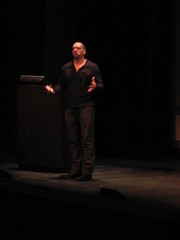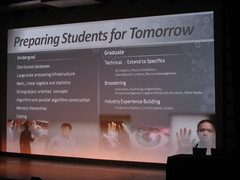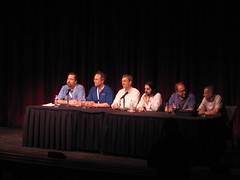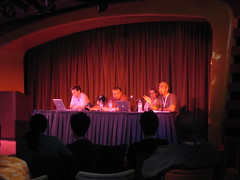

Next on the schedule was a panel about “Creating and Managing an Academic Games Program” with Ian Bogost (Georgia Tech), Gary Brubaker (The Guildhall at SMU), Andrew Phelps (Rochester Institute of Technology), Walker White (Cornell University), Jim Whitehead (UC Santa Cruz), Michael Zyda (USC Gamepipe)

In the discussion one of the questions were about how to avoid students to “crash and burn” during their games projects. Michael Zyda said that they at UCS use “best practices”, and weekly planning meetings. I.e. putting a heavy focus on the work process. Ian said that, well, let them crash and burn, that’s the best way to learn. This is a problem that most student groups encounter, and the general meaning of the audience and the panel was that it is a good thing that they learn early on, in the education what it is to crash and burn in order to avoid doing that later on, both in their final exam projects and when the students go into the industry.
After this I went to another panel: “Funding Landscape for Games-Related Research”
with Mary Lou Maher (National Science Foundation), John Nordlinger (Microsoft Research), Ben Sawyer (Digital Mill), Roger Smith (US Army PEO STRI).

This panel was focused around the funding landscape in the US. There was a question about the funding landscapes on other continents put to the audience, but no one stepped up, so the panel continued focusing on the US.
Mary Lou Mahler from the National Science Foundation (of the US) recommended people to volunteer as reviewers, and to develop a communication with NSF. Focus areas that people doing games related research can tap into is social computing, health related issues and education(“no kid left behind”).
John Nordlinger from Microsoft stressed the importance of that, once there is funding in place, to make sure that the results are communicated to the funding organization. (ie don’t embarrass the person who believed in your project)
Ben Sawyer ended the session by asking his little son, who was also on the stage on what to say when one needs funding and got the answer “daddy daddy daddy daddyyy”. Nice illustration of persistence and persuasiveness!